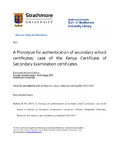A Prototype for authentication of secondary school certificates: case of the Kenya Certificate of Secondary Examination certificates
Abstract
More often Universities and training institution in Kenya enroll students who want to further their education. Due to increased demand for educated labor force, the number of individuals reported to have used illegitimate KCSE certificates to join these Universities has increased. Perpetrators of this crime have succeeded despite the fact that there are measures to verify and authenticate KCSE certificates.
The study examined common forms of document fraud as well as current features used to secure paper documents. Therefore, the aim of this research was to develop a prototype based on digital signature and QR-code technique which would assist institutions in verification of certificates.
Agile software development methodology was adopted in developing the prototype. This involved requirements gathering, architecture and design, development and testing. This research was conducted in Nairobi County, targeting a population of thirty seven accredited Universities. In the study both public and private universities were considered in order to eliminate any form of biasness.
Data collection tools such as questionnaires were used to gather both qualitative and quantitative data. This data was analyzed qualitatively and quantitatively and presented in pie charts and bar graphs and frequency tables with the aid of statistical tool SPSS. More than 87% of respondents said that the current features were not sufficient in preventing document fraud. In addition, 98% confirmed that a computer based system would greatly contribute towards detecting fake certificates. Consequently, after the prototype was developed and tested 78% of the respondents agreed that a digital system was leveraging on the current security measures and authentication processes.
Collections
- MKSU Masters Theses [146]

